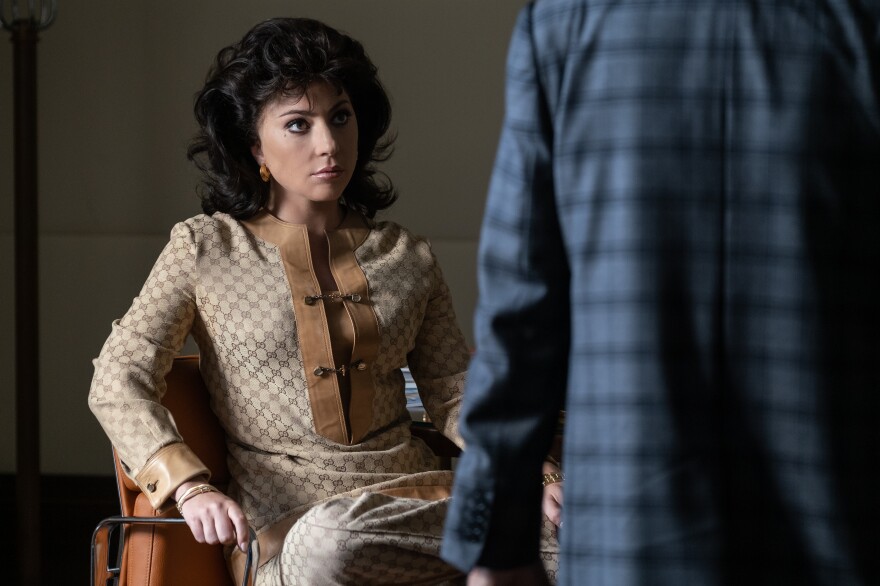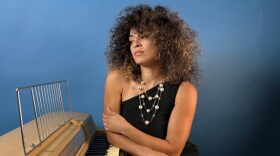(Heads up: This story contains spoilers about the movie House of Gucci.)
In House of Gucci, Lady Gaga's character, Patrizia Reggiani, is famous for two reasons. She was married to Maurizio Gucci, grandson of the company's founder Guccio Gucci — and she was convicted having the fashion heir killed in 1995.
To prepare for the role, Gaga said she spent months studying Reggiani for director Ridley Scott's new film.
"I had to decide as an actress, 'Did she have the murder gene? Was she born a killer?' And I don't believe she was," Gaga told NPR host A Martínez on Morning Edition. "I think that it was these trigger points of trauma throughout her life that turned her into what she became, which was a monster."
The film, released on Thanksgiving in the U.S., is based on the 2001 book The House of Gucci: A Sensational Story of Murder, Madness, Glamour, and Greed.
Already, the film has drawn substantial criticism. Lady Gaga and other actors attempts at speaking with Italian accents have been panned.
On Nov. 29, the heirs of former chairman Aldo Gucci, who was Maurizio's uncle, issued a statement saying that the movie's portrayal of the family was inaccurate and that they were depicted as "thugs, ignorant and insensitive to the world around them."
Asked about that criticism, Lady Gaga said her heart goes out to the family.
"This must be extremely painful to watch it. A true life story come through in what is essentially our version of what we believe to be the truth and Ridley's version of the story," she said.
Lady Gaga added that she did her best to make it "a story about women and survival."
In the interview with NPR's Morning Edition, she discussed her part in House of Gucci, from her accent to how the role came to her at a time of crisis in her own life.
Interview Highlights
Take us through that process of nailing that accent down.
[Dialect coach Beatrice Pelliccia] was with me every day on set, and I spoke in my accent all the time and I don't speak fluent Italian. I speak some Italian. The Italian that I do speak, I speak in my own accent. I've known Donatella Versace for years, so I can speak sometimes like Donatella. So in a way, I took my time to erase the things that I do so that I could study the way that she talked, so that it would be authentic and real and and specific. So when she's younger, you'll notice her voice is higher, and then later in the film, her voice is lower. So there was a real sort of scientific way that I approached that. And because I'm a singer — vowel sounds and consonants, all sorts of things — you learn how to do things with your mouth. So I studied in a very particular way, but a lot of it was just the time and the focus and the dedication and living in it.
How much of a hold would you say the brand of Gucci had on Patrizia?
I think that Patrizia was really intrigued that Maurizio didn't want to be part of the family business because she grew up with so much less than him. She couldn't possibly fathom this idea that you would have a dynasty at your disposal, but that you would not take hold of it and cherish it and run it.
She was a survivalist, and she was weaving herself in and out of the family. And I really tried to tap into this idea that is it less about being opportunistic and is it more about "How do I take what life is putting in front of me" and "How can I be the absolute best at it?" "How can I seize it?" "How can I not only survive but win in a way that my family's never won before?"
You've said that this role came to you at a difficult time in your own life. Can you tell us a little bit about why that time was difficult for you?
I have a hard time with fame. I have for many years grappled with this sort of existential crisis of love and creating art and also longing for a more private life. I found this character and I read it and I talked to Ridley, and Ridley said to me, "She really loved him." And then I thought to myself, "that I know how to do," meaning to play a killer and to simply play something that lacks dynamics where you just play an evil person for the duration of the film, that is uninteresting to me.
But the idea that she would have been a real young girl and a real woman that fell madly in love and thought she mattered because she was smart. Thought she mattered because she was strong. Thought she mattered because he loved her. And then to be left behind and abandoned. I do think that that was the hat trick with this movie is that there was heart put into this film, and I think it could have easily been just something that was compelling to watch. But I think it became something that was compelling, but also something that provoked empathy for all the characters, meaning empathy for this family. This war, this war over their own skins and and this war over Gucci.
NPR's Danny Hajek produced A Martínez's interview with Lady Gaga for Morning Edition. Kroc fellow Mia Estrada adapted it for the web.
Copyright 2022 NPR. To see more, visit https://www.npr.org.







